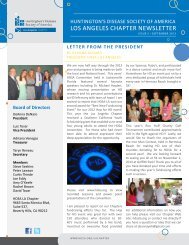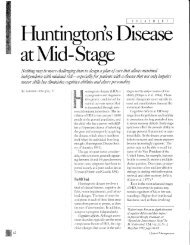Understanding Behavior in HD.final.8-18-05 - Huntington's Disease ...
Understanding Behavior in HD.final.8-18-05 - Huntington's Disease ...
Understanding Behavior in HD.final.8-18-05 - Huntington's Disease ...
You also want an ePaper? Increase the reach of your titles
YUMPU automatically turns print PDFs into web optimized ePapers that Google loves.
21<br />
As <strong>HD</strong> causes the neurons <strong>in</strong> the caudate to degenerate, the ability of the bra<strong>in</strong>’s circuits to communicate<br />
becomes more and more impaired. It may take longer and longer for the person with <strong>HD</strong> to answer your<br />
question. He/she will experience <strong>in</strong>creas<strong>in</strong>g difficulty simply f<strong>in</strong>d<strong>in</strong>g the right words. It may take the person<br />
with <strong>HD</strong> much longer to respond. Consequently, several common scenarios occur: (a) the person with <strong>HD</strong><br />
becomes frustrated and/or fatigued and gives up; (b) the listener becomes frustrated and/or fatigued and gives<br />
up; (c) the listener assumes that the person with <strong>HD</strong> cannot answer the question and cont<strong>in</strong>ues with yet<br />
another question; (d) the listener assumes that the person with <strong>HD</strong> cannot answer the question and makes the<br />
decision unilaterally.<br />
Here is another example of a typical<br />
question asked to a person affected by <strong>HD</strong>:<br />
“What would you like for d<strong>in</strong>ner?” It is easy<br />
to assume that people with <strong>HD</strong> no longer<br />
have preferences for food and no longer care<br />
about their diets. However, it is more likely<br />
that the degeneration of the neurons causes<br />
such long delays to get their preferences out<br />
that one of the communication failures cited<br />
above occurs (i.e., patient or listener gives up<br />
or listener assumes an answer). <strong>HD</strong> does not<br />
typically erase an <strong>in</strong>dividual’s personal op<strong>in</strong>ions. The method of ask<strong>in</strong>g and answer<strong>in</strong>g questions may need to<br />
be altered to have successful communication. For <strong>in</strong>stance, it might be more effective to give the person with<br />
<strong>HD</strong> a choice of available menus for d<strong>in</strong>ner. “Would you prefer pizza or turkey for d<strong>in</strong>ner?” Giv<strong>in</strong>g such cues<br />
can assist the neuronal communication <strong>in</strong> the bra<strong>in</strong>. As the bra<strong>in</strong> hears the word “pizza,” specific pizza<br />
neurons activate and are more easily retrieved.<br />
Organiz<strong>in</strong>g your words and ideas logically is what helps others understand what you mean to<br />
communicate. As the caudate deteriorates, access to the part of the bra<strong>in</strong> that helps to sequence, organize,<br />
prioritize, and delegate tasks (the frontal lobes, or “boss”) is compromised (see p. 2). Without the boss to tell<br />
the bra<strong>in</strong> what <strong>in</strong>formation should go first and what <strong>in</strong>formation should wait until later, the output, or speech,<br />
of the <strong>HD</strong>-affected person becomes garbled.<br />
<strong>Understand<strong>in</strong>g</strong> of speech can become impaired if the organization of <strong>in</strong>put is affected by <strong>HD</strong>.<br />
Sometimes, <strong>in</strong>dividuals with <strong>HD</strong> have difficulty understand<strong>in</strong>g or act<strong>in</strong>g upon <strong>in</strong>formation that is given to<br />
them. Typically, the <strong>HD</strong>-affected person understands each unique word without difficulty, but complex<br />
sentences and paragraphs become mixed up without the “boss” to organize them. Similar to the organization<br />
of the <strong>in</strong>formation that is go<strong>in</strong>g out of the bra<strong>in</strong>, the <strong>in</strong>formation that is com<strong>in</strong>g <strong>in</strong>to the bra<strong>in</strong> is difficult to<br />
organize when the caudate cannot regulate <strong>in</strong>formation for the frontal lobes. Although the person with <strong>HD</strong><br />
can hear <strong>in</strong>formation without difficulty, the components of the <strong>in</strong>formation become jumbled and mixed up<br />
without the caudate and frontal lobes to keep them separated.

















